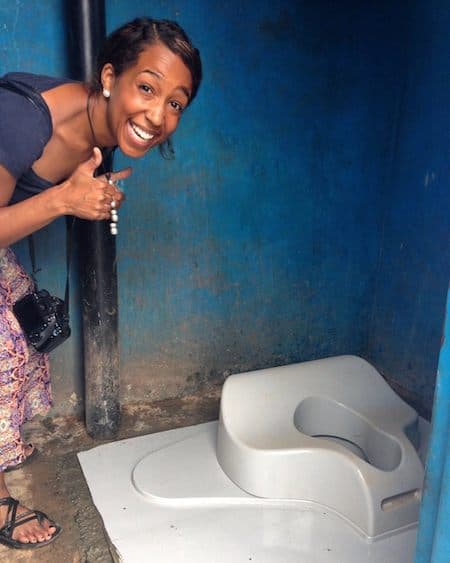Finding a Sanitation Destiny: ‘I Am Supposed to Design Toilets’
Kyle Poplin: How did you get interested in sanitation and hygiene in developing countries?
Jasmine Burton: In 2011, as a freshman at Georgia Tech, I was inspired to do something about the global sanitation crisis at a women’s leadership conference. I learned from a Georgia Tech alumna and one of my current mentors, Susan Davis of Improve International, that nearly half of the world doesn’t have access to a toilet; of those people, women and girls are disproportionately burdened. Specifically, I learned that pubescent girls in the developing world frequently drop out of school as a result of their schools lacking toilets. As a product designer and woman in higher education, this reality angered me so much so that I left the conference and called my mom to say, “I know what I am supposed to do. I am supposed to design toilets.” This declaration about my destiny was made at the wise age of 18 and was fueled by my design education. I was learning that many product designers design trend products that are fashionable for five to 10 years, but that are then thrown away. I knew that I did not want to design something that would be thrown away when a new style becomes trendy.
KP: How did you come up with the idea for the SafiChoo and what makes it unique?
 Jasmine Burton (left): Design knowledge is becoming critical in global health, international development and human rights activist spaces, as many disease outbreaks and global health disparities are the byproducts of the designed and built environment in which all people live. This is what sparked my senior design team to develop SafiChoo, an inexpensive mobile sanitation solution intended to reduce oral-fecal contamination and the spread of waterborne diseases. The original SafiChoo toilet design included a sit-squat toilet seat, which enabled people of all abilities to use the toilet, and a three-part drawer system that separated the different consistencies of waste so that it could be repurposed in the community. After being the first all-female team to win first place and the people’s choice awards at the Georgia Tech 2014 InVenture Prize competition – the largest undergraduate invention competition in the United States – we were able to pilot our design at the Kakuma refugee camp in Kenya last summer under the auspices of Sanivation and in tandem with the Centers for Disease Control and Prevention and Norwegian Refugee Council. (Watch my “Shark Tank”-like pitch here.) Being in the field enabled us to interface with actual users and form relationships with them, which ultimately is reflected in the iterations that SafiChoo has since undergone. We learned that the drawer system and seat were not intuitive for the users; therefore, we now have a much wider toilet bowl and have a bucket-based waste collection system, all of which has been designed to improve the overall user experience via emphatic and human-centered design principles. I have since founded a social startup called Wish for WASH LLC (W4W) to house the development of SafiChoo and that is intended to bring innovation to sanitation through culturally specific research, design and education. SafiChoo has since been iterated to be a toolbox of options that best meets the needs of users (ability/preference/cultural norms/budget) as well as the waste management capacity of the community (fecal sludge management/solar treatment/septic/compost/etc.).
Jasmine Burton (left): Design knowledge is becoming critical in global health, international development and human rights activist spaces, as many disease outbreaks and global health disparities are the byproducts of the designed and built environment in which all people live. This is what sparked my senior design team to develop SafiChoo, an inexpensive mobile sanitation solution intended to reduce oral-fecal contamination and the spread of waterborne diseases. The original SafiChoo toilet design included a sit-squat toilet seat, which enabled people of all abilities to use the toilet, and a three-part drawer system that separated the different consistencies of waste so that it could be repurposed in the community. After being the first all-female team to win first place and the people’s choice awards at the Georgia Tech 2014 InVenture Prize competition – the largest undergraduate invention competition in the United States – we were able to pilot our design at the Kakuma refugee camp in Kenya last summer under the auspices of Sanivation and in tandem with the Centers for Disease Control and Prevention and Norwegian Refugee Council. (Watch my “Shark Tank”-like pitch here.) Being in the field enabled us to interface with actual users and form relationships with them, which ultimately is reflected in the iterations that SafiChoo has since undergone. We learned that the drawer system and seat were not intuitive for the users; therefore, we now have a much wider toilet bowl and have a bucket-based waste collection system, all of which has been designed to improve the overall user experience via emphatic and human-centered design principles. I have since founded a social startup called Wish for WASH LLC (W4W) to house the development of SafiChoo and that is intended to bring innovation to sanitation through culturally specific research, design and education. SafiChoo has since been iterated to be a toolbox of options that best meets the needs of users (ability/preference/cultural norms/budget) as well as the waste management capacity of the community (fecal sludge management/solar treatment/septic/compost/etc.).
KP: What makes your firm different from others in the human waste management business?
JB: W4W is a social impact organization that strives to save lives by bringing innovation to sanitation through culturally-specific research, design and education. The SafiChoo solution, W4W’s first line of sanitation relief products, is a sanitary toilet that can be universally and easily deployed by the customer (such as international aide organizations) while simultaneously being culturally specific with a toolbox of options that enables the end user to choose how to use the toilet to best meet their preferences – whether that is sitting, squatting or washing. We are focusing heavily on the “capture,” or first phase of the sanitation value chain, and therefore are developing ways for one toilet to connect with existing waste management infrastructure or to be a self-contained system. Although we are still very much researching and iterating our design, SafiChoo is innovative because it seeks to incorporate human-centered design and community-driven solutions to best improve the user experience in all parts of the market (from manufacturing to shipping to distributing to customers to end users).
KP: You’re piloting your toilets now. How many are you testing, and where, and what do you hope to learn?
JB: Currently, W4W is in its beta design pilot where we are just testing a couple of toilets in an effort to practice lean manufacturing and rapid prototyping ideologies. A toilet is being used in a peri-urban community in Zambia while another is being built for use by resettled refugees outside of Atlanta, Ga. Through this quick beta pilot phase, we seek to gain insights from end users about whether the proof of concept product that we have presented them actually meets their needs or if there are still several more iterations (needed) to be a minimum viable product that can exist on the market. As this is a design pilot, we are focusing on the user experience and the physicality of the toilet and after these pilots conclude, we seek to move into a larger scale production run with a larger sample size over a longer period of time to begin monitoring and evaluating the health benefits of our solution before bringing it to mass production. We still have a ways to go but we hope to stay true to the human-centered design process in order to create a sustainable sanitation option for use in resource-constrained settings.
KP: What are the keys to solving the open defecation problem worldwide?
JB: Addressing the world’s global sanitation crisis definitely requires user-focused sanitation technologies, but it also requires more: Improved sanitation calls for significant behavior changes and value shifts in people which, I believe, are the most challenging aspects of this work. Open defecation, where people poop in bushes or in “flying toilets” (bags that they then throw on the ground or the roof), is largely practiced in low-resource settings because they have no other sustainable sanitation options. Some cultures believe that they are supposed to go to the bathroom in public and in full view of God because it is more hygienic and natural than going in a toilet. Other people want a toilet but don’t have the resources in place to maintain one. I believe that in order to improve the open defecation problem of the world, technologies need to meet people where they are in terms of cost, accessibility, usability and maintenance. Additionally, through behavior change, communications marketing strategies and through innovative and low-cost ways of getting poop away from people, slowly we will begin to collectively change the culture of how open defecation is viewed and/or how it affects health. For most of the communities where W4W works, we have found that most of our users understand the benefits of getting poop away from people which creates a natural incentive for wanting a toilet and investing their hard-earned money in a toilet. The value of a toilet is clear. However, not all communities’ beliefs and norms align with the global health agenda. In instances like this, I have heard of toilet prototypes (specifically in India) where sewer drains are turned into urinals/drains so as to better manage the overwhelming presence of open defecation/urination that might take years to effectively educate the nation about in a way that leads to changed behavior. Overall, I believe open defecation is a huge challenge in the WASH (water, sanitation and hygiene) space that can only be addressed via community-led education and behavior change methodologies in addition to user-focused and intuitive toilet options that meet that particular community where it is. However, ultimately I believe that education is the only way that we can prove the value of getting poop away by capturing it in some sort of sanitation receptacle.
KP: What are your short- and long-term goals?
JB: We are a young team of students and recent graduates from the Georgia Institute of Technology that is deeply passionate about this work. The third generation of SafiChoo will be determined based on the data that we collect following this year’s pilot in Zambia and Atlanta, both of which will be funded by the finances that we raised in our 2015 Indiegogo campaign. Following the pilots, we will continue iterating the design and business plan to create the most sustainable, holistic and human-centered approach possible. After gaining a minimum viable product and proof of concept for SafiChoo, we would also like to diversify our product line by working on more WASH innovations such as menstrual hygiene management or hand-washing related products and services.
KP: What advice would you give others who might want to start a business in a developing economy?
JB: Innovation and social impact work in today’s world is incredibly inspiring and it is exciting to see a movement of young people interested in building a better and more equitable future for their communities. My advice listed below really is led by my call for more STEM (science, technology, engineering and mathematics) in the social sector:
1) Gain a hard skill: Whether that’s coding, designing, engineering or even knowing a language, hard skills are imperative in effectively conducting social impact/humanitarian work. In a world suffering from extreme poverty, malnutrition, violence and inequity, we need more doers, creators and makers working in this space in tandem with the policy-makers, international development officers and business professionals to create holistic and interdisciplinary solutions to more effectively make sustainable change.
2) Develop a global awareness: Make an intentional effort to increase your global awareness by watching the news, reading newspapers and knowing about current humanitarian events/crises. From this awareness a passion can be born from which meaningful social impact work can emerge.
3) Invest in people: Align yourself with insightful mentors and partners who are seeking to make similar changes and with whom your work parallels. Social impact work requires developing meaningful relationships in order to gain traction and to do work that actually is making a difference.
4) Believe that you have the power to make a difference. If you are young, people will often doubt your ability to act on your large, change-making ideologies, but despite the naysayers, if you believe in yourself you will be so surprised to see how much of an impact you have the capacity to make.
Kyle Poplin is the editor of NextBillion Health Care.
Photos courtesy of Wish for WASH on Facebook
- Categories
- Health Care, WASH
- Tags
- sanitation



